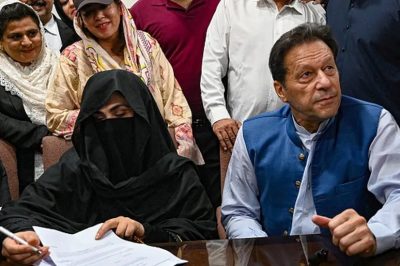The ruling in the ‘un-Islamic’ marriage case known as the ‘Iddat Ruling’ involving the former Pakistani Prime Minister Imran Khan and his spouse, Bushra Bibi, has provoked intense criticism and brought up significant issues regarding the protection of women’s rights and privacy in Pakistan.
The decision by Senior Civil Judge Quratullah to sentence the couple to seven years in jail for allegedly contracting marriage during the ‘iddat’ period has not only been deemed controversial but also a direct violation of established legal principles and fundamental human rights.
In a case filed by Bibi’s former husband, Khawar Maneka, in November last year, Senior Civil Judge Quratullah convicted Khan and his wife, Bushra Bibi, to seven years in prison and a Rs 500,000 fine each for “contracting marriage during the ‘iddat’ (period of waiting).” The couple married on January 1, 2018, and Maneka contacted the court roughly six years later, stating that the two married without Bibi finishing her ‘iddat.’
This case revolves around a frightening intrusion into the private lives of individuals, particularly women. The judgment not only disregarded the settled legal principle but also delved into sensitive matters such as menstruation and marital relationships.
The specific ruling under Pakistan Penal Code Section 496 indicates a risky overreach of state power into private affairs. By criminalizing behaviors that should be matters of personal choice and religious interpretation, the court has created a worrisome precedent that jeopardizes women’s autonomy and dignity nationwide.
Also Read: Neelum Valley: A nature’s masterpiece of beauty
Feminists, women attorneys, civil society, and human rights advocates have decried this decision as a clear violation of women’s autonomy and dignity. The ruling erodes women’s freedom to choose marriage and divorce without worrying about the consequences of their actions and embodies the heinous intrusion into their personal lives. It also illustrates the legal system’s fundamental faults, which strong entities can exploit to target and victimize women.
Furthermore, the ruling creates a dangerous precedent for situations in the future in which women can experience the same kind of mistreatment and persecution due to arbitrary legal interpretations. It opens the door to witch hunts and legal abuse by former husbands, further marginalizing and stigmatizing women in society. This poor decision’s consequences go far beyond the people involved; it risks Pakistani women’s fundamental liberties and rights.
The case also highlights Pakistan’s dire need for legislative change and stronger protection of women’s rights. Although the Pakistan Penal Code has undergone revisions to protect women from legal abuse linked to adultery and fornication, the arbitrary use of antiquated sections 496 and 496-B renders these protections ineffective in the face of state overreach.
Legal analysts and specialists have questioned the judgment’s legal foundation. They urged that the judiciary should preserve people’s rights, not intrude into their personal lives. The choice to question whether a lady had completed her ‘iddat’ period before remarrying undermines her privacy while also perpetuating damaging preconceptions about women and their independence.
The broader consequences of this decision also cannot be underestimated. It establishes a precedent that may encourage individuals to use the judicial system against their former spouses, resulting in witch hunts and legal harassment. In addition to undermining women’s rights, this also damages public confidence in the justice system and fosters a climate of intimidation and fear.
The Imran Khan marriage case reflects a hazardous regression in women’s rights, as well as a harsh reminder of the difficulties in gender equality in Pakistan. It acts as a wake-up call for all parties involved to denounce such flagrant human rights breaches and endeavor to create a legal framework that protects equality, autonomy, and dignity for every person, regardless of gender. Failure to do so risks perpetuating the discrimination and inequity experienced by women in Pakistan.
** The opinions expressed in this article are solely those of the author and do not reflect the views or position of World Affairs Insider. The organization neither endorses nor takes responsibility for the content of this article and its accuracy.
International Relations Scholar interested in National Security strategies, with a good focus on Geo-Politics, Foreign Policy, and Public & Cultural Diplomacy.







